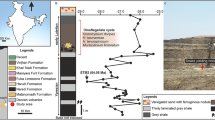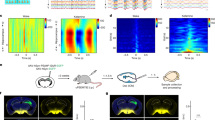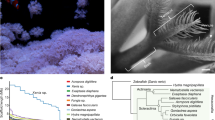Abstract
DURING investigations into the nutrition of the monogenetic trematode Diplozoon pcwadoxum (parasitic on the gills of minnow, roach, rudd, etc.), it was noted that portions of the nervous system gave a strong positive reaction for non-specific esterase. This observation led to the development of a simple but effective method for demonstrating the entire nervous system in the intact animal.
This is a preview of subscription content, access via your institution
Access options
Subscribe to this journal
Receive 51 print issues and online access
$199.00 per year
only $3.90 per issue
Buy this article
- Purchase on Springer Link
- Instant access to full article PDF
Prices may be subject to local taxes which are calculated during checkout
Similar content being viewed by others
References
Pearse, A. G. E., Histochemistry, Pure and Applied, second ed. (J. and A. Churchill, Ltd., London, 1960).
Jennings, J. B., J. Helminth., 33, 197 (1959).
Author information
Authors and Affiliations
Rights and permissions
About this article
Cite this article
HALTON, D., JENNINGS, J. Demonstration of the Nervous System in the Monogenetic Trematode Diplozoon paradoxum Nordmann by the Indoxyl Acetate Method for Esterases. Nature 202, 510–511 (1964). https://doi.org/10.1038/202510a0
Issue Date:
DOI: https://doi.org/10.1038/202510a0
This article is cited by
-
Cholinergic components of nervous system of Schistosoma mansoni and S. haematobium (Digenea: Schistosomatidae)
Parasitology Research (2016)
-
Neuroanatomy of Cornudescoides kulkarnii n. sp., a gill parasite of Mystus vittatus in Meerut (UP), India
Journal of Parasitic Diseases (2012)
-
Neuromusculature of Macrogyrodactylus congolensis, a monogenean skin parasite of the Nile catfish Clarias gariepinus
Parasitology Research (2007)
-
Neuromusculature of Macrogyrodactylus clarii, a monogenean gill parasite of the Nile catfish Clarias gariepinus in Egypt
Parasitology Research (2004)
-
Histochemical Demonstration of the Inhibitory Effect of Nuvan® and Neguvon® on Cholinesterase Activity in Pseudodactylogyrus anguillae (Monogenea)
Acta Veterinaria Scandinavica (1988)
Comments
By submitting a comment you agree to abide by our Terms and Community Guidelines. If you find something abusive or that does not comply with our terms or guidelines please flag it as inappropriate.



